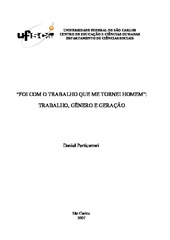Foi com o trabalho que me tornei homem: trabalho, gênero e geração
Abstract
The research had as objective to study how the increase on the number of women labor force
has affected the division of the domestic work and the construction of the masculine social
identity based in the provider paper, through the workers' perception on this change. This
study examines the re-meaning or reiteration of the gender identities, having as cross section
the generation insertion in the world of the work.
Forty two metallurgic workers of São Carlos, SP (being thirty men and twelve women) had
been interviewing, recovering the trajectories of life and work and their gender attributions, in
the industrial and domestic space. The choice of the metallurgic sector elapsed for consisting
in a space of masculine work historically recognized, being this profile changed, slowly, in
last the two decades.
It was possible to verify a generation cross section that delimits the position of the workers in
relation to the work division and their expectation on their gender identity. It has been noticed
that the oldest workers (with more than 40 years old), still see in the formal job market (with
steady work and labor register) the privileged way of access in the labor and familiar
structuring and the construction and valuation of the masculine identity.
Presence of a speech of bigger equality between men and women was verified in workers
between 30 to 39 years old. Finally, it was observed that young workers (until 29 years old)
have greater propensity to insert themselves in the logic of transformations of flexible
capitalism, marked for the instability in the labor trajectories. This context has influenced
some changes in the gender perception in relation to the sexual division of the work and the
biggest dubiousness of the construction of the masculine identity entailed to the work
